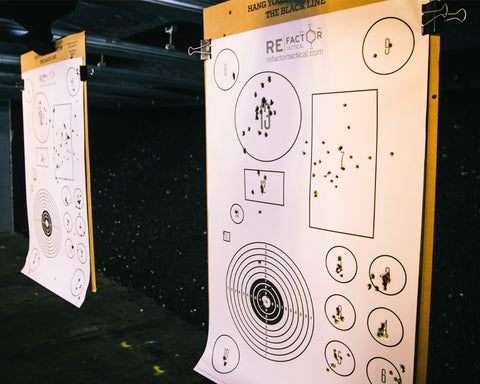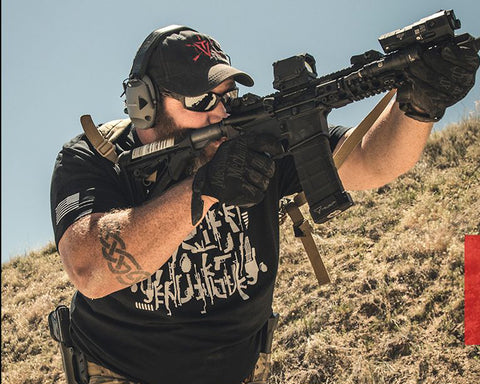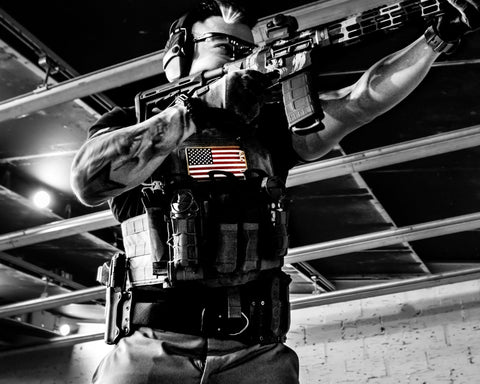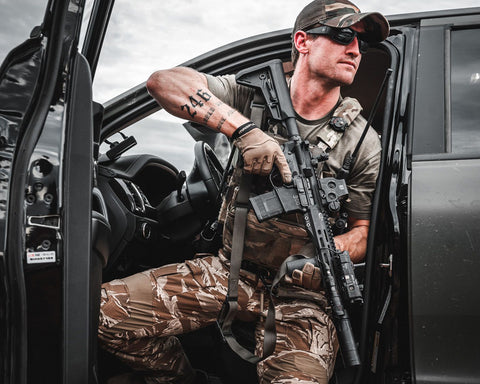Each Commandant of the Marine Corps has a suggested reading list for professional development that they recommend to their Marines. When a new Commandant is named, a new reading list is developed that reflects what the new commandant believes will make Marines into the best war-fighters and leaders possible.
There are specific reading lists for each stage of a Marines Career that range from a junior enlisted reading list, all the way to a Senior Commissioned Officer list, and all career phases in between. The current Commandant of the Marine Corps, Robert B. Neller, has developed the current list below specifically for Non-Commissioned Officers or NCOs and is designed to not only develop NCOs into better leaders but also to give them a further understanding of military and Marine Corps history. Through the study of past conflicts, it not only allows the reader to develop an intimate knowledge of strategies used in previous wars such as the Civil War and WWII but also first-hand accounts of the feelings and experiences that troops felt during these conflicts.
Although the technologies of war will always change, the insights of great leaders are timeless. And at no time are those lessons more important than in the heat of combat with lives on the line. The key is in preparation before a conflict. Battle Leadership helps you be prepared by teaching such essential skills as:
How to handle different personalities under extreme stress.
How to prepare your troops psychologically for combat.
Insight into proven battlefield tactics (even if some of those tactics are only still relevant for their historical insights).
How to instill confidence in those following you.
While military tactics change, the wisdom of true leadership invariably holds. These lessons can even be applied to running a business, non-profit, or government department, but they are crucial to every military commander or aspiring officer. Find out why when lives are on the line, generations have turned to and continue to learn from Battle Leadership.
Ghost Fleet is a page-turning imagining of a war set in the not-too-distant future. Navy captains battle through a modern-day Pearl Harbor; fighter pilots duel with stealthy drones; teenage hackers fight in digital playgrounds; Silicon Valley billionaires mobilize for cyber-war; and a serial killer carries out her own vendetta. Ultimately, victory will depend on who can best blend the lessons of the past with the weapons of the future. But what makes the story even more notable is that every trend and technology in the book—no matter how sci-fi it may seem—is real.
The debut novel by two leading experts on the cutting edge of national security, Ghost Fleet has drawn praise as a new kind of technothriller while also becoming the new “must-read” for military leaders around the world.
–You walk into a restaurant and get an immediate sense that you should leave.
— You are about to step onto an elevator with a stranger and something stops you.
— You interview a potential new employee who has the resume to do the job, but something tells you not to offer a position.
These scenarios all represent LEFT OF BANG, the moments before something bad happens. But how many times have you talked yourself out of leaving the restaurant, getting off the elevator, or getting over your silly “gut” feeling about someone? Is there a way to not just listen to your inner protector more, but to actually increase your sensitivity to threats before they happen?
Legendary Marine General James Mattis asked the same question and issued a directive to operationalize the Marine Corps’ Combat Hunter program. A comprehensive and no-nonsense approach to heightening each and every one of our gifts of fear, LEFT OF BANG is the result.
On Killing: The Psychological Cost of Learning to Kill in War and Society by
Psychologist and US Army Ranger Dave Grossman writes that the vast majority of soldiers are loath to pull the trigger in battle. Unfortunately, modern armies, using Pavlovian and operant conditioning, have developed sophisticated ways of overcoming this instinctive aversion.
The mental cost for members of the military, as witnessed by the increase in post-traumatic stress, is devastating. The sociological cost for the rest of us is even worse: Contemporary civilian society, particularly the media, replicates the army’s conditioning techniques and, Grossman argues, is responsible for the rising rate of murder and violence, especially among the young.
Drawing from interviews, personal accounts, and academic studies, On Killing is an important look at the techniques the military uses to overcome the powerful reluctance to kill, of how killing affects the soldier, and of the societal implications of escalating violence.
Outliers: The Story of Success by
In this stunning new book, Malcolm Gladwell takes us on an intellectual journey through the world of “outliers”–the best and the brightest, the most famous and the most successful. He asks the question: what makes high-achievers different?
His answer is that we pay too much attention to what successful people are like, and too little attention to where they are from: that is, their culture, their family, their generation, and the idiosyncratic experiences of their upbringing. Along the way, he explains the secrets of software billionaires, what it takes to be a great soccer player, why Asians are good at math, and what made the Beatles the greatest rock band.
Brilliant and entertaining, Outliers is a landmark work that will simultaneously delight and illuminate.
Resilience: Hard-Won Wisdom For Living a Better Life by
In 2012, Eric Greitens unexpectedly heard from a former SEAL comrade, a brother-in-arms he hadn’t seen in a decade. Zach Walker had been one of the toughest of the tough. But ever since he returned home from war to his young family in a small logging town, he’d been struggling. Without a sense of purpose, plagued by PTSD, and masking his pain with heavy drinking, he needed help. Zach and Eric started writing and talking nearly every day, as Eric set down his thoughts on what it takes to build resilience in our lives.
Eric’s letters—drawing on both his own experience and wisdom from ancient and modern thinkers—are now gathered and edited into this timeless guidebook. Greitens shows how we can build purpose, confront pain, practice compassion, develop a vocation, find a mentor, create happiness, and much more. Resilience is an inspiring meditation for the warrior in each of us.
“This book is a gift not only to Greitens’s comrades-in-arms, but to readers everywhere.” — Publishers Weekly, starred review
The Defense of Duffer’s Drift by
Following the invasion of Iraq in 2003, the U.S. military found itself in a battle with a lethal and adaptive insurgency, where the divisions between enemy and ally were ambiguous at best, and working with the local population was essential for day-to-day survival. From the lessons they learned during multiple tours of duty in Iraq, two American veterans have penned The Defense of Jisr al-Doreaa, an instructional parable of counterinsurgency that addresses the myriad of difficulties associated with war in the postmodern era.
In this tactical primer based on the military classic, The Defence of Duffer’s Drift, a young officer deployed for the first time in Iraq receives ground-level lessons about urban combat, communications technology, and high-powered weaponry in an environment where policy meets reality. Over the course of six dreams, the inexperienced soldier fights the same battle, again and again, learning each time—the hard way—which false assumptions and misconceptions he needs to discard in order to help his men avoid being killed or captured. As the protagonist struggles with his missions and grapples with the consequences of his mistakes, he develops a keen understanding of counterinsurgency fundamentals and the potential pitfalls of working with the native population.
Accompanied here by the original novella that inspired it, The Defense of Jisr al-Doreaa offers an invaluable resource for cadets and junior military leaders seeking to master counterinsurgency warfare—as well as general readers seeking a deeper understanding of the wars in Iraq and Afghanistan. Just as its predecessor has been a hallmark of military instruction, The Defense of Jisr al-Doreaa will draw the road map for counterinsurgency in the postmodern world.
The Killer Angels: The Classic Novel of the Civil War by
In the four most bloody and courageous days of our nation’s history, two armies fought for two conflicting dreams. One dreamed of freedom, the other of a way of life. Far more than rifles and bullets were carried into battle. There were memories. There were promises. There was love. And far more than men fell on those Pennsylvania fields. Bright futures, untested innocence, and pristine beauty were also the casualties of war. Michael Shaara’s Pulitzer Prize-winning masterpiece is unique, sweeping, unforgettable—the dramatic story of the battleground for America’s destiny.
In The Revenge of Geography, Kaplan builds on the insights, discoveries, and theories of great geographers and geopolitical thinkers of the near and distant past to look back at critical pivots in history and then to look forward at the evolving global scene. Kaplan traces the history of the world’s hot spots by examining their climates, topographies, and proximities to other embattled lands. The Russian steppe’s pitiless climate and limited vegetation bred hard and cruel men bent on destruction, for example, while Nazi geopoliticians distorted geopolitics entirely, calculating that space on the globe used by the British Empire and the Soviet Union could be swallowed by a greater German homeland.
Kaplan then applies the lessons learned to the present crises in Europe, Russia, China, the Indian subcontinent, Turkey, Iran, and the Arab Middle East. The result is a holistic interpretation of the next cycle of conflict throughout Eurasia. Remarkably, the future can be understood in the context of temperature, land allotment, and other physical certainties: China, able to feed only 23 percent of its people from land that is only 7 percent arable, has sought energy, minerals, and metals from such brutal regimes as Burma, Iran, and Zimbabwe, putting it in moral conflict with the United States. Afghanistan’s porous borders will keep it the principal invasion route into India, and a vital rear base for Pakistan, India’s main enemy. Iran will exploit the advantage of being the only country that straddles both energy-producing areas of the Persian Gulf and the Caspian Sea. Finally, Kaplan posits that the United States might rue engaging in far-flung conflicts with Iraq and Afghanistan rather than tending to its direct neighbor Mexico, which is on the verge of becoming a semi-failed state due to drug cartel carnage.
West Point’s Recommended Reading List
A brilliant rebuttal to thinkers who suggest that globalism will trump geography, this indispensable work shows how timeless truths and natural facts can help prevent this century’s looming cataclysms.
We Were Soldiers Once… And Young by
In November 1965, some 450 men of the First Battalion, Seventh Cavalry, under the command of Lt. Col. Harold Moore, were dropped into a small clearing in the Ia Drang Valley. They were immediately surrounded by 2,000 North Vietnamese soldiers. Three days later, only two and a half miles away, a sister battalion was brutally slaughtered. Together, these actions at the landing zones X-Ray and Albany constituted one of the most savage and significant battles of the Vietnam War. They were the first major engagements between the US Army and the People’s Army of Vietnam.How these Americans persevered—sacrificing themselves for their comrades and never giving up—creates a vivid portrait of war at its most devastating and inspiring. Lt. Gen. Moore and Joseph L. Galloway—the only journalist on the ground throughout the fighting—interviewed hundreds of men who fought in the battle, including the North Vietnamese commanders. Their poignant account rises above the ordeal it chronicles to depict men facing the ultimate challenge, dealing with it in ways they would have once found unimaginable. It reveals to us, as rarely before, man’s most heroic and horrendous endeavor.With the Old Breed: At Peleliu and Okinawaby
NEW YORK TIMES BESTSELLER
In The Wall Street Journal, Victor Davis Hanson named With the Old Breed one of the top five books on epic twentieth-century battles. Studs Terkel interviewed the author for his definitive oral history, The Good War. Now E. B. Sledge’s acclaimed first-person account of fighting at Peleliu and Okinawa returns to thrill, edify, and inspire a new generation.
An Alabama boy steeped in American history and enamored of such heroes as George Washington and Daniel Boone, Eugene B. Sledge became part of the war’s famous 1st Marine Division—3rd Battalion, 5th Marines. Even after intense training, he was shocked to be thrown into the battle of Peleliu, where “the world was a nightmare of flashes, explosions, and snapping bullets.” By the time Sledge hit the hell of Okinawa, he was a combat vet, still filled with fear but no longer with panic.
Based on notes Sledge secretly kept in a copy of the New Testament, With the Old Breed captures with utter simplicity and searing honesty the experience of a soldier in the fierce Pacific Theater. Here is what saved, threatened, and changed his life. Here, too, is the story of how he learned to hate and kill—and came to love—his fellow man.

















Leave a Reply
Your email address will not be published. Required fields are marked *